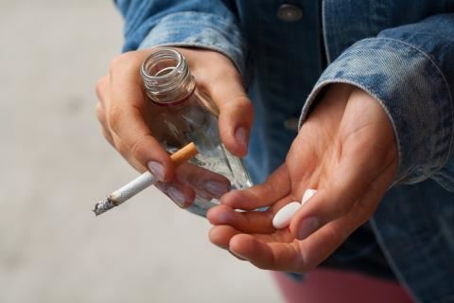It seems counterintuitive but wealthy teenagers are more likely to become addicted to alcohol and drugs than children from families that are less fortunate.
An Arizona State University study found that socially and economically privileged American high school kids can be at a high risk for substance misuse across early adulthood.
“We found alarmingly high rates of substance abuse among young adults who we initially studied as teenagers,” said Suniya Luthar, a professor of psychology at Arizona State University, who led the research. “Results showed that among both men and women and across annual assessments, these young adults had substantial elevations, relative to national norms, in frequency of several indicators—drinking to intoxication and of using marijuana, stimulants such as Adderall, cocaine, and club drugs such as ecstasy.”
The study followed young adults from ages 18 to 27. To be eligible, their family had to earn more than $167,000 per year and live in a home worth at least $1 million. The research focused on students in affluent communities in the northeastern United States as part of the New England Study of Suburban Youth.
“We found rates of addiction to drugs or alcohol among 19 to 24 percent of women in the older cohort by the age of 26, and 23 to 40 percent among men. These rates were three and two times as high respectively, as compared to national norms,” Luthar said. “Among the younger cohort by the age of 22 years, rates of addiction were between 11 and 16 percent among women (close to national norms) but 19 to 27 percent among men, or about twice as high as national norms.”
Great Expectations and a Good Allowance
Luthar believes the higher substance misuse is at least in part derived from academic pressure put on wealthy teenagers by their parents, most of whom have college degrees.
“Essentially you have to be the best, or else you’re not good enough,” says Luthar. “With that pressure comes self-medication. … The tremendous pressure these kids say they’re under to excel and achieve and accomplish across multiple domains—academic, extracurricular, and even social.”
With a sheltered life comes the parental expectation of good grades for these kids—and a fair amount of spending money. “Many kids in these communities have plenty of disposable income with which they can get high-quality fake IDs, as well as alcohol and both prescription and recreational drugs,” says Luthar.
Other risk factors include widespread peer approval for substance use, and the fact that parents can be lulled into a false sense of security. Many fail to detect serious underlying issues their children might have as long as they continue to perform well in school. As a result, parents are sometimes too lenient about alcohol or marijuana use of their kids when they detect it.
If underlying issues exist and remain untreated, however, the substance misuse can escalate and turn into addiction. "Paradoxical though it may seem, these ostensibly privileged youth, many of who start experimenting early and often with drinking and drugs, could well be among the groups at highest risk for alcoholism and addiction in adulthood," says Professor Luthar.
About Decision Point Center
Decision Point Center provides a full range of drug and alcohol addiction and substance use disorder treatment services for people 18 and older. From detoxification to residential inpatient treatment, we offer a full continuum of care. Our experienced staff of licensed counselors provides individualized therapy based on the unique needs of each patient based on a comprehensive assessment.
Need drug or alcohol addiction treatment in Arizona? Our office can be reached at (844) 292-5010 or via our secure online contact form.

